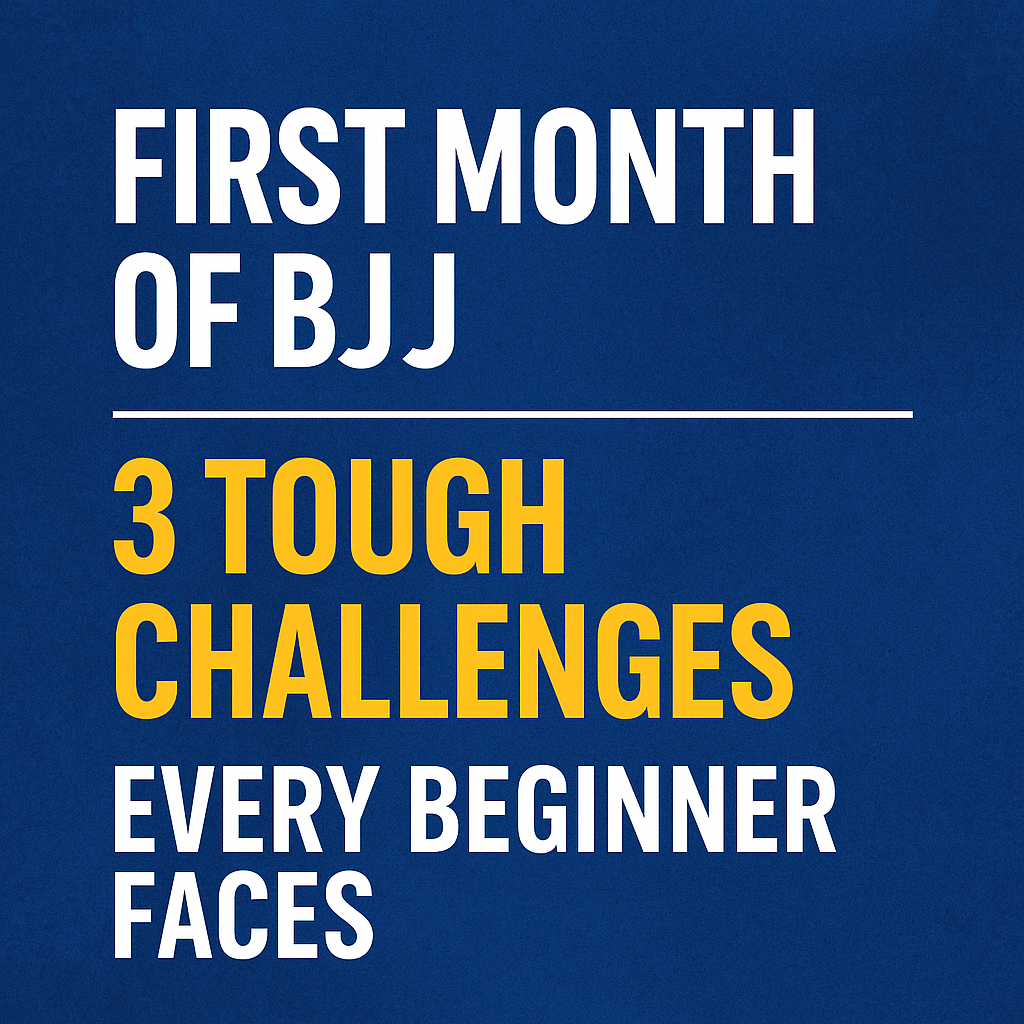Introduction
Starting Brazilian Jiu Jitsu can feel intimidating. If you’re asking yourself what to expect in your first month of BJJ, the honest answer is that it won’t be easy—but it will be worth it. Every new white belt faces a steep learning curve. The movements feel awkward, rolling can feel overwhelming, and progress seems slower than you hoped. But here’s the good news: you aren’t expected to know anything in your first month of bjj. These struggles are normal, and overcoming them is exactly what makes Jiu Jitsu so rewarding.
In this post, we’ll break down the 3 toughest challenges every beginner faces in their first month of BJJ—and give you strategies to overcome them.
1. Feeling Lost in BJJ Positions and Techniques
In your first month of BJJ, you’ll be introduced to new positions and movements that feel completely foreign compared to your normal body mechanics. Shrimping, bridging, and framing won’t feel natural at first, and when you’re drilling with a partner it’s normal to feel a little goofy, uncoordinated, and even overwhelmed.
On top of the physical challenges, you’ll also have to learn the terminology for positions and techniques. Words like “closed guard,” “side control,” and “hip escape” might sound confusing early on. Don’t be discouraged—this all gets easier with mat time.
✅ How to overcome it: Keep it simple. Focus only on what you’re learning that day, and pay close attention to the flow drills your instructor provides. These drills are designed to give new students a sense of direction and help you learn how to move with your partner rather than against them. Over time, you’ll notice these movements becoming more natural.
👉 Subscribe to our White Belt Jiu Jitsu Online Hub Page to explore flow drills that will help you progress in your first month of bjj.
2. Adjusting to Pace, Etiquette, and Beginner Mindset
The pace of rolling can overwhelm beginners. Even when a partner goes light, the pressure feels intense. On top of that, class etiquette can be confusing. Should you bow before stepping on the mat? How do you ask a higher belt to roll? What’s the right way to tap?
This is where many students in their first month of BJJ struggle—not with technique, but with confidence. Pride and nerves can both get in the way.
✅ How to overcome it: Remember that BJJ is about learning, not winning. Tap early, breathe, and treat each roll as practice, not competition. Respect etiquette by keeping your gi clean, trimming nails, arriving on time, and thanking partners after rolling.
👉 Read BJJ Rules for Beginners: 10 Helpful Unwritten Etiquette Tips.
3. Measuring Progress and Fighting Frustration
One of the hardest parts of the first month of BJJ is feeling like you’re not improving. Many beginners leave class thinking, “I just got tapped ten times in a row. Am I even learning?” But progress isn’t measured only by submissions or escapes—it often comes from learning to stay calm under pressure.
When you can breathe, think, and make better decisions during stress, you’re improving in one of the most valuable ways BJJ has to offer. That isn’t something you can track with a scoreboard or a stripe, but you’ll know when you start to feel it on the mats.
Progression in Jiu Jitsu is about being just a fraction better than you were yesterday. Maybe you escaped a little faster, held guard a little longer, or simply stayed relaxed when you normally would have panicked. These small wins compound over time, turning frustration into confidence.
✅ How to overcome it: Train 2–3 times per week to build consistency. Track small victories in a notebook so you can see progress over time. Remind yourself that BJJ is a marathon, not a sprint, and every black belt once felt the same frustrations.
Conclusion & Next Steps
Your first month of BJJ will test you in three big ways: learning strange new movements, adjusting to the pace and etiquette of class, and finding progress in small victories. These challenges are real, but they’re also what make Brazilian Jiu Jitsu so transformative. By facing them head-on, you’ll build resilience, confidence, and discipline both on and off the mats.
Remember, every black belt has survived their first month—and you can too.
👉 Start your free trial today at NGMA Thibodaux and take your first step toward long-term progress.
For structured lessons outside of class, explore our White Belt Jiu Jitsu Online Hub Page and Ultimate White Belt Blog Guide.

